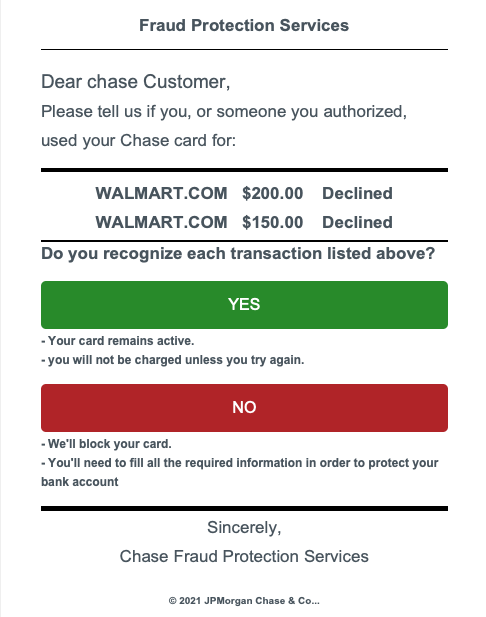While scanning my inbox, I noticed an email from Chase. It mentioned something about a potential fraud alert on one of our accounts.

It didn’t take long for me to figure out this was a fake.
The first thing is there is not even a Chase logo anywhere.
I then noticed the scammers sent this email to an address I don’t have on file with Chase.
The next clue? The email was addressed to Undisclosed-Recipients:

If Chase is sending you an email about fraud, it’s addressed to you.
The final hint was that the email was sent from a charter.net email address. I’m sure this is the email from some poor person who clicked on one of these links and not who actually sent the message, so I’m not going to share that email.
I’ve dealt with fake “capital ONE” emails before but not usually from fake “chase.”
I did a quick search to find out how to report a fake email to Chase.

Whatever you do, if you receive an email like this, don’t click on anything. If you want to be safe, just delete it immediately. If you’re sure you can do so safely, forward it to the bank/business/whatever’s fraud dept. They’re easy to find if you just Google the company name and spoof email.
Want to comment on this post? Great! Read this first to help ensure it gets approved.
#stayhealthy #staysafe #washyourhands #wearamask #getyourCOVIDvaccine
Like this post? Please share it! We have plenty more just like it and would love it if you decided to hang around and get emailed notifications of when we post. Or maybe you’d like to join our Facebook group – we have 20,000+ members and we talk and ask questions about travel (including Disney parks), creative ways to earn frequent flyer miles and hotel points, how to save money on or for your trips, get access to travel articles you may not see otherwise, etc. Whether you’ve read our posts before or this is the first time you’re stopping by, we’re really glad you’re here and hope you come back to visit again!
This post first appeared on Your Mileage May Vary
Cover Image by mohamed Hassan from Pixabay

2 comments
I hope that your “Who falls for this?” won’t discourage people who have been victims to speak up and talk to their banks right away. I don’t think we should shame people who fall for scams — they have done nothing wrong. Our energy needs to be spent on finding and prosecuting the scammers, and in getting restitution for those who have been harmed.
That was not my intent. I’ve received some really convincing spoof emails but sometimes it looks like the scammers aren’t even trying.